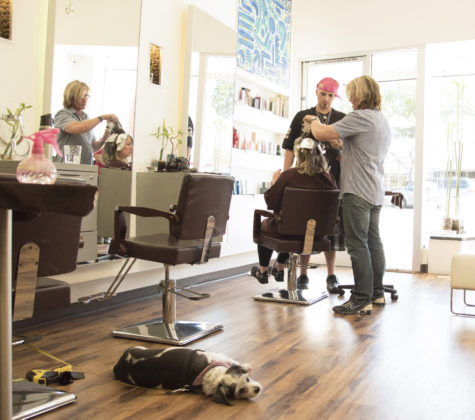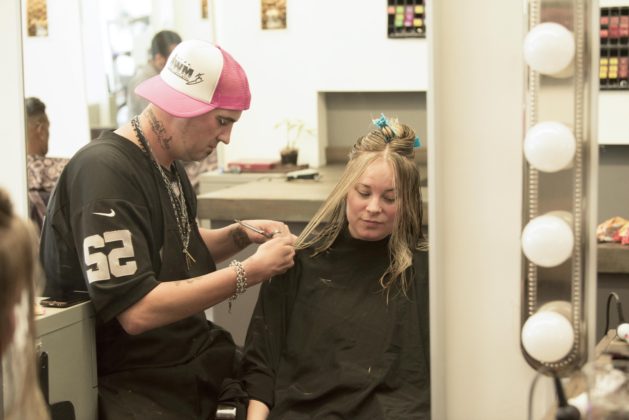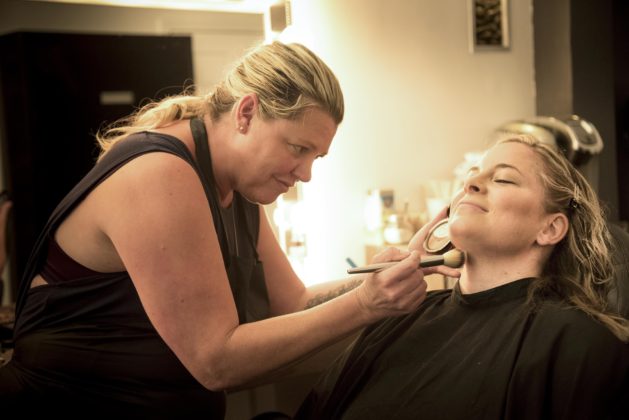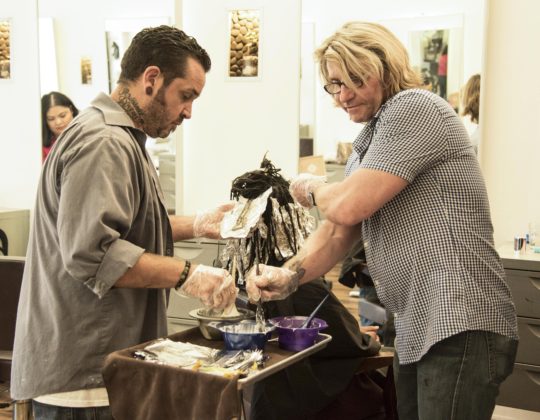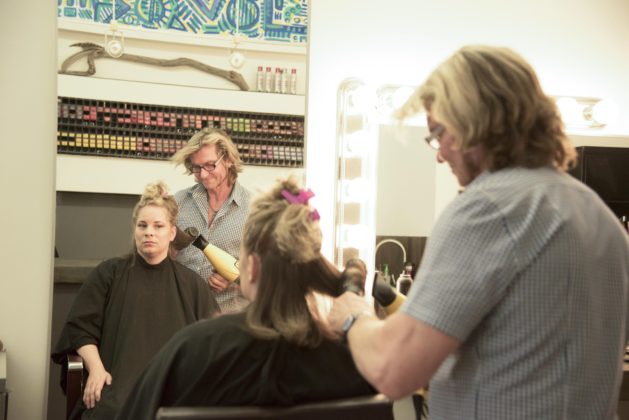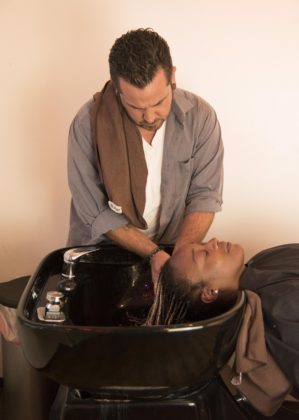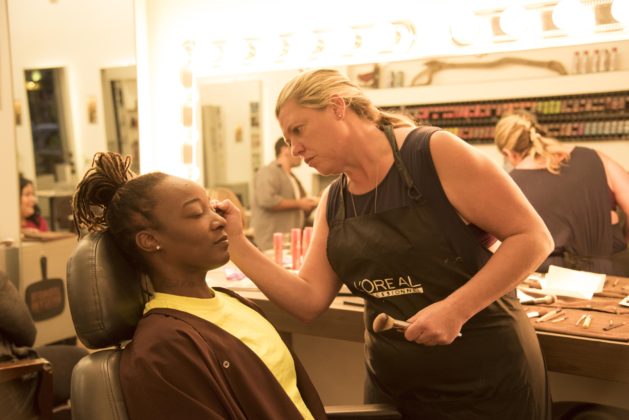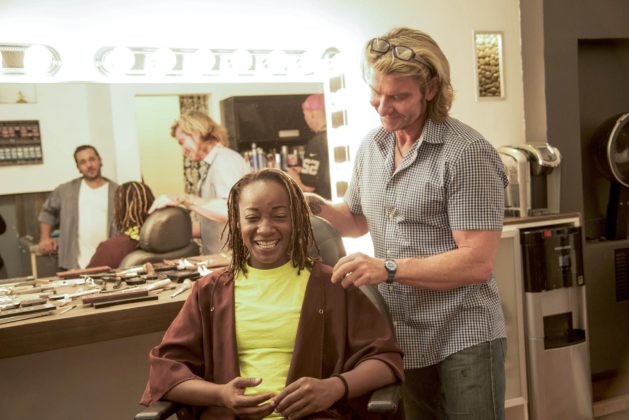Inside a Los Angeles salon, wooden floors and a posh interior give the room an inviting atmosphere. The hairdresser stations are spaced uniformly, with dark espresso-colored leather seats and tall narrow mirrors that line either side of the walls. Colorful shampoo bottles in pastel shades of pink, lilac, mint, yellow and cream are displayed neatly on shelves like pieces of art in a gallery.
Army veteran Keniquea Mitchell entered through the doors, and after a few steps she stopped dead in her tracks as tears continuously streamed down her flushed cheeks. Wiping her tears away with the sleeves of her sweater, she was met warmly with an embrace into the arms of Michael John Derricott, a sandy-haired man with kind eyes.
After her tears subsided, a rich brown robe was draped around her body, as she tied the strings into a bow around her waist. She sat patiently in a hairdresser chair awaiting her transformation.
Makeovers are Derricott’s speciality, and serving women, while lifting the spirits of those who have served our country, is representative of his life’s work.
Derricott, founder and CEO of Makeovers That Matter, said he felt something shift in January of 2012. He closed his book for appointments on Tuesdays at his West Hollywood Ra Hair House Salon and opened his heart to those that needed his services the most by cutting hair for homeless women at Gettlove in Hollywood, a transitional facility that helps the homeless enter permanent housing.
Derricott did some soul searching for redirection, and found himself through deep meditation. He decided he wanted to devote himself to helping economically challenged women.
“My intention, as this world began to grow around me, was simply to empower women and do charity work,” Derricott said.
On May 5, 2013, Derricott put together a pilot program that helped women with spiritual counseling, interviewing skills, wardrobe styling and complete makeovers. Of the 19 women that originally registered with the program, 15 were veterans.
“I love my country. I’m a blue blooded American and super conservative when it comes to my country,” Derricott said. “I thought to myself ‘oh my gosh, these women need to move to the front of the line.’ This is the community that I was meant to serve.”
Derricott created the Mindset Program in the fall of 2014, which provides traditional job training, cover letter writing, resume, social media, Linkedin and research opportunities to women in the military.
Mitchell, 33, first joined the army when she was 18 years old and served for eight years.
“It was hard, because you change in the Army, and people back at home don’t understand,” Mitchell said. “I didn’t even understand that I had Post Traumatic Stress Disorder when I came back. My family didn’t know what was wrong with me.”
Despite her struggles, Mitchell said she appreciates the opportunity Makeovers That Matter is giving her.
As tears began to well up in Mitchell’s eyes, she said she wouldn’t be involved with Makeovers That Matter if she hadn’t sent handwritten letters to the organization.
“That’s part of the reason I’m crying,” Mitchell said. “I can’t believe I’m here right now. This is a dream.”
Gladys Berry joined the Air Force at 17 years old. She was raped shortly after enlisting, according to Berry.
Memories of her sexual assault had been suppressed after the incident. However, Berry said routine therapy sessions and medication help her to cope.
“I’ve had to fight my family and friends and let them know this is something that is working for me,” Berry said. “So I do it, and I encourage any woman that needs help to seek help. Don’t let anybody tell you it won’t work.”
Berry said Makeovers That Matter helped her improve her perception of herself.
“When I reached out to Makeovers That Matter, I was so happy when they told me I was chosen for a makeover, because I feel like I changed from the inside,” Berry said. “But my outside isn’t representative of that change. So, I just want my inside and outside to match.”
Derricott said the organization expanded their reach beyond veterans to military caregivers and spouses.
“These are women who are completely overlooked and underserved. So, I want to do everything I can to help them get jobs and be self sustaining and get them on their feet,” Derricott said.
J. Hill’s Staffing Service Recruiter Molly Winawir said based on her psychology background, Post Traumatic Stress Disorder can stand in the way of fulfilling career goals.
“When people have PTSD, it’s difficult to maintain relationships in a certain way, and that can translate into the workplace. So, it can have to do with effective communication, or ability to let someone in, and establishing a connection when you have your own things to work through. ”
Army veteran Josie Fedo, 36, joined the military when she was 18, and was diagnosed with Military Sexual Trauma and PTSD caused by being raped in the military.
Fedo said the Mindset Program has helped her mentality.
“I think the program has helped me build my confidence and made me self aware of how far one little thought in my mind can spread, whether it’s something good or bad,” Fedo said. “MJ is definitely one to push that mindfulness and mindset of positivity and doing things to enrich yourself.”
Fedo said her makeover experience was better than she imagined.
“I loved it,” Fedo said. “Just being apart of that made me feel truly blessed to have somehow found my way to his team of people.”
Fedo said she appreciates the organization that focuses on female veterans.
“Female veterans need help,” Fedo said. “We are definitely a niche, and there’s not a whole lot of us, but we are out there, and we are very much a minority.”
Johnny Ciccone, owner of Headbetter Salon said he partnered with the organization after Derricott reached out to him.
“Part of my job as a hairdresser has been to help find the beauty that God gives them,” Ciccone said. “If you can light up somebody’s eyes to realize that they are already beautiful, then you’ve already done your job.”
Derricott plans on launching an online version of the Mindset Program in 2018 which will eliminate geographical boundaries.
“From day one, I have known I wanted to have a national organization. Granted, all along the way I have had to learn what it takes to visualize my next steps,” Derricott said. “I just see what happens, and as I’m need to do another task I will learn how to do it, accomplish it and move forward.”

